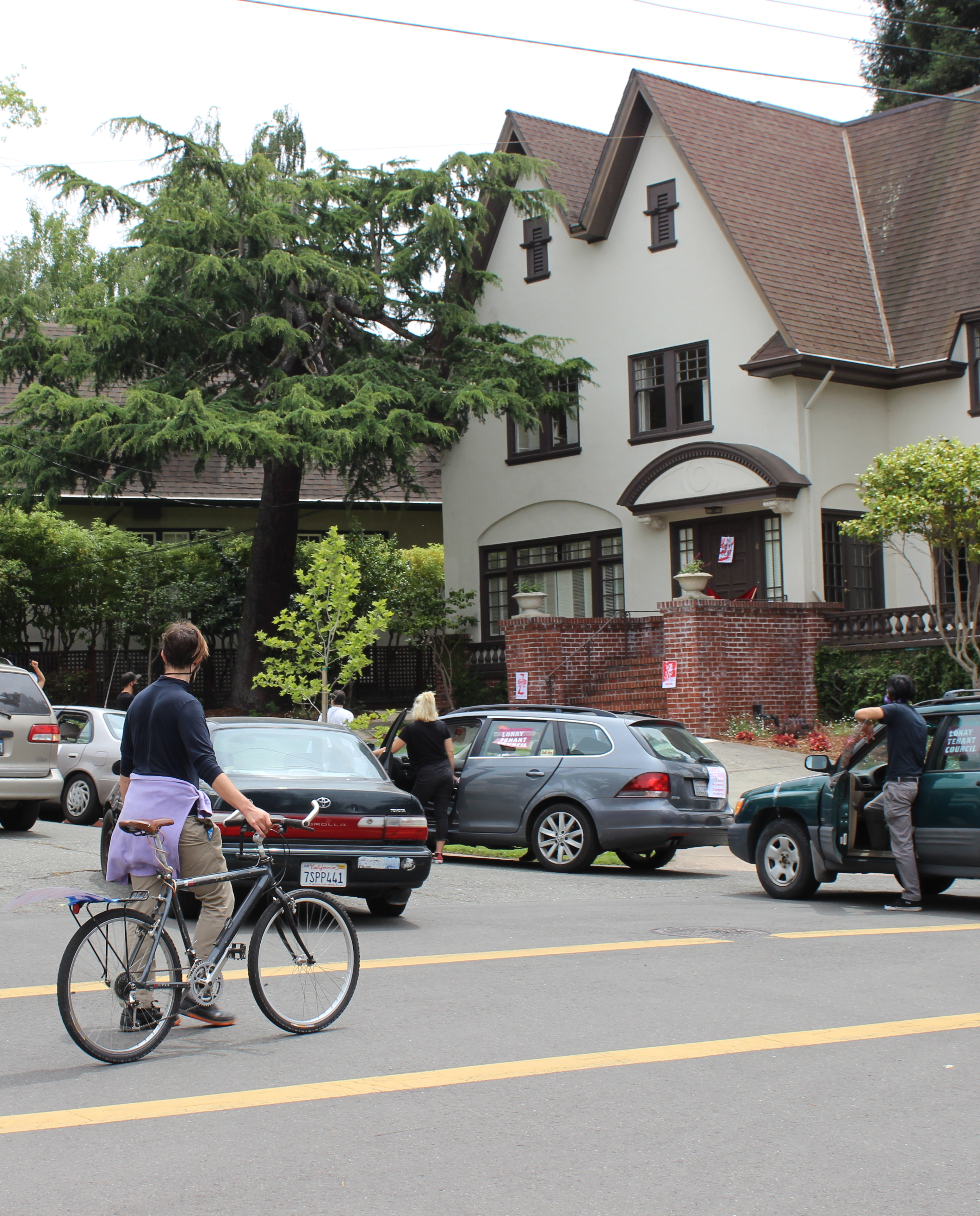Activism
Tenant Union Demands Landlords Negotiate, Protest in Piedmont

The Lonay Tenant Council (LTC) and supporters formed a caravan of over 40 vehicles and several bikes that started in Oakland last Sunday to protest at two large homes in Piedmont belonging landlords Linda Lonay and Mohommad and to deliver a list of tenant demands.
One member read those demands outside Lonay’s home through a loudspeaker. Those demands include: rent cancellation for those who need it during the pandemic; rent reduction for all until the end of the year; approval of all new tenants moving in; an end to rent increases when a lease signatory tenant leaves, and fixing all mold and disrepair.
LTC and supporters went to Lonay’s home because she has not responded to their requests to negotiate. They attached signs to vehicles and honked loudly while driving through Piedmont.
Shortly after, much of the approximately 60 person crowd chanted “cancel rent.”
“It felt like a release for all of us,” said Michelle Mitchell*, a tenant of Lonay and Hooshmand’s and LTC member. “For the last few months we’ve been under a lot of pressure from Lonay to fork over a lot of money. But we have a lot of people. We know each other. We know what [she’s] doing to us. [She] can’t just knock us around.”
LTC is a group of Lonay and Hooshmand’s tenants who have unionized to make collective demands. Since Lonay communicates with tenants, most of LTC’s organizing has been directed towards her.
Lonay served on Oakland’s rent board from 2011 to 2014. At a City Council committee meeting in 2014, she spoke in favor of a measure she said made it easier for “small-time landlords” to compete with large corporations by limiting rent increases based on capital improvements to 10% per year.
The Oakland Post e-mailed Lonay questions about her requirements for adding new tenants, how she has handled rodent outbreaks, and whether she recognizes the tenant council. She answered with this statement:
“We are committed to complying with all the obligations of rental housing providers, and we are proud of our record,” the statement read.
“We care about our residents, and have been providing financial accommodations to many of them since mid-March, based on their individual circumstances. We don’t address everyone at once because all of our tenants are individuals, each with their own circumstances. We take pride in our maintenance record, often receiving commendations for our quick service. We are all in this together.”
When LTC looked into Lonay’s public records they did not see her as a small-time landlord. She and Hooshmand rent out at least 28 buildings in Oakland and Berkeley and one of their two personal homes in Piedmont is worth approximately $3 million. Under increased economic pressure from the COVID-19 pandemic, many LTC members are withholding rent.
Knowing about Lonay’s wealth and experiencing stress due to her neglect as a landlord has them especially frustrated at what they see as pushy efforts to collect.
Mitchell says Lonay has called her cell phone repeatedly to pressure her for money, but tenants can’t be evicted for rent owed during this time due to city, county, and state legal protections related to COVID-19.
Tenants say Lonay has harassed them by pressuring tenants to move out in the past.
“She has showed up at my house at odd hours,” said LTC member Justin Gilmore. “One time, she arrived at our home unannounced at around 11:00 p.m. wearing all black. That time she came to demand that we vacate and accept a buy-out for a few thousand dollars.”
LTC member Sofía de Leon,* who lives with Mitchell, said they’ve experienced intense rodent infestations. De Leon said she “even found rodent poop in [her] bed.”
“The exterior of our house was never properly sealed. But [Lonay] continued to tell us the problem was that we were keeping bags of rice in our kitchen,” said Mitchell.
Some LTC members who have occupied Lonay and Hooshmand’s units for years pay lower than average area rent for rooms because they’re under rent control. But tenants share total costs of multi-room homes and when one tenant moves out, it’s difficult to find a replacement tenant.
De Leon said Lonay demands a credit score of 750 or above to rent a room from her. Other LTC members say she’s rejected potential tenants without reasonable explanation, and that it’s been especially difficult to get Black tenants and other people of color approved. In comments from a 2017 East Bay Express story, Lonay said she sought “young professional” tenants.
The difficult approval process means rooms sit empty and remaining tenants have additional rent burden. When a tenant on the lease moves out and other tenants not on the lease remain, Lonay has raised their rent.
Andrew Levin said Lonay displaced him in 2017 when she raised the rent on his two- bedroom apartment from $2,400 to $3,295, two weeks after his roommate, who was the lease signatory, moved out. Levin then moved out as well. The rent was too high.
LTC said they are fighting back. They have connected with lawyers to make each other aware of their rights. They have used the threat of collectively withholding rent for leverage to negotiate with Lonay, as it is expensive to evict a lot of tenants at once.
The protesters found some support in the community.
“I enjoyed the horn-honking” said Piedmont resident Elise Marie Collins on Twitter, who was teaching an online yoga class as the caravan passed. “I knew it wasn’t a graduation celebration. I could feel the dissent in the sounds.”
Collins also suggested people squat at one of Lonay and Hooshmand’s two homes.
LTC left a list of demands and a “three-day notice to negotiate” with tenants.
*Both Michelle Mitchell and Sofía de Leon are pseudonyms used because they fear retaliation from Lonay and Hooshmand for speaking about them.

Lonay Tenant Council and supporters protest outside the Piedmont home of landlord Linda Lonay and Mohommad Hooshmand’s after delivering a list of tenant demands outside their door.
Activism
Oakland Schools Honor Fred Korematsu Day of Civil Liberties
Every Jan. 30, OUSD commemorates the legacy of Fred Korematsu, an Oakland native, a Castlemont High School graduate, and a national symbol of resistance, resilience, and justice. His defiant stand against racial injustice and his unwavering commitment to civil rights continue to inspire the local community and the nation. Tuesday was “Fred Korematsu Day of Civil Liberties and the Constitution” in the state of California and a growing number of states across the country.

By Post Staff
Every Jan. 30, OUSD commemorates the legacy of Fred Korematsu, an Oakland native, a Castlemont High School graduate, and a national symbol of resistance, resilience, and justice.
His defiant stand against racial injustice and his unwavering commitment to civil rights continue to inspire the local community and the nation. Tuesday was “Fred Korematsu Day of Civil Liberties and the Constitution” in the state of California and a growing number of states across the country.
One OUSD school is named in his honor: Fred T. Korematsu Discovery Academy (KDA) elementary in East Oakland.
Several years ago, founding KDA Principal Charles Wilson, in a video interview with anti-hate organization “Not In Our Town,” said, “We chose the name Fred Korematsu because we really felt like the attributes that he showed in his work are things that the children need to learn … that common people can stand up and make differences in a large number of people’s lives.”
Fred Korematsu was born in Oakland on Jan. 30, 1919. His parents ran a floral nursery business, and his upbringing in Oakland shaped his worldview. His belief in the importance of standing up for your rights and the rights of others, regardless of race or background, was the foundation for his activism against racial prejudice and for the rights of Japanese Americans during World War II.
At the start of the war, Korematsu was turned away from enlisting in the National Guard and the Coast Guard because of his race. He trained as a welder, working at the docks in Oakland, but was fired after the bombing of Pearl Harbor in 1941. Fear and prejudice led to federal Executive Order 9066, which forced more than 120,000 Japanese Americans out of their homes and neighborhoods and into remote internment camps.
The 23-year-old Korematsu resisted the order. He underwent cosmetic surgery and assumed a false identity, choosing freedom over unjust imprisonment. His later arrest and conviction sparked a legal battle that would challenge the foundation of civil liberties in America.
Korematsu’s fight culminated in the Supreme Court’s initial ruling against him in 1944. He spent years in a Utah internment camp with his family, followed by time living in Salt Lake City where he was dogged by racism.
In 1976, President Gerald Ford overturned Executive Order 9066. Seven years later, the 9th Circuit Court of Appeals in San Francisco vacated Korematsu’s conviction. He said in court, “I would like to see the government admit that they were wrong and do something about it so this will never happen again to any American citizen of any race, creed, or color.”
Korematsu’s dedication and determination established him as a national icon of civil rights and social justice. He advocated for justice with Rosa Parks. In 1998, President Bill Clinton gave him the Presidential Medal of Freedom saying, “In the long history of our country’s constant search for justice, some names of ordinary citizens stand for millions of souls … To that distinguished list, today we add the name of Fred Korematsu.”
After Sept. 11, 2001, Korematsu spoke out against hatred and discrimination, saying what happened to Japanese Americans should not happen to people of Middle Eastern descent.
Korematsu’s roots in Oakland and his education in OUSD are a source of great pride for the city, according to the school district. His most famous quote, which is on the Korematsu elementary school mural, is as relevant now as ever, “If you have the feeling that something is wrong, don’t be afraid to speak up.”
Activism
WOMEN IMPACTING THE CHURCH AND COMMUNITY
Juanita Matthews, better known as “Sister Teacher,” is a walking Bible scholar. She moved to California from the great state of Arkansas in 1971. Sister Teacher has a passion for teaching. She has been a member of Bible Fellowship Missionary Baptist Church since 1971.

Sister Juanita Matthews
55 Years with Oakland Public School District
The Teacher, Mother, Community Outreach Champion, And Child of God
Juanita Matthews, better known as “Sister Teacher,” is a walking Bible scholar. She moved to California from the great state of Arkansas in 1971. Sister Teacher has a passion for teaching. She has been a member of Bible Fellowship Missionary Baptist Church since 1971. She followed her passion for teaching, and in 1977 became the lead teacher for Adult Class #6. Her motto still today is “Once My Student, Always My Student”.
Beyond her remarkable love for the Lord, Sister Teacher has showcased her love for teaching by working for the Oakland Unified School District for 55 years, all but four of those years spent at Emerson Elementary and Child Development School. She truly cares about her students, making sure they have the tools/supplies needed to learn either at OUSD or Bible Fellowship Missionary Baptist Church.
She’s also had a “Clothes Closet Ministry” for 51 years, making sure her students have sufficient clothing for school. The Clothes Closet Ministry extends past her students, she has been clothing the community for over 50 years as well. She loves the Lord and is a servant on a mission. She is a loving mother to two beautiful children, Sandra and Andre. This is the impact this woman of God has on her church and the community.
Activism
Oakland’s ‘Green the Church,’ Others, Host a Climate Revival
On April 20, Oakland’s Green The Church California (GTC) and the Center For Food, Faith and Justice will celebrate Earth Day and present a Climate Revival event titled “Growing Healthy Communities From Soil To The Soul” at McGee Avenue Baptist Church at 1640 Stuart St, Berkeley, CA. The day will include inspiring talks, interactive workshops, networking opportunities, and a special panel on Food Sovereignty and Global Food Resilience.

Growing Healthy Communities from Soil to the Soul in Berkeley
By Y’Anad Burrell
On April 20, Oakland’s Green The Church California (GTC) and the Center For Food, Faith and Justice will celebrate Earth Day and present a Climate Revival event titled “Growing Healthy Communities From Soil To The Soul” at McGee Avenue Baptist Church at 1640 Stuart St, Berkeley, CA,
The day will include inspiring talks, interactive workshops, networking opportunities, and a special panel on Food Sovereignty and Global Food Resilience.
The keynote speaker is Rev. Danté R. Quick, PhD, senior pastor of First Baptist Church of Lincoln Gardens in Somerset, N.J. Quick is well known in the Bay Area, having served for more than 10 years as pastor of Friendship Missionary Baptist Church in Vallejo, CA.
Green The Church, founded in 2010 by Rev. Dr. Ambrose Carroll, Sr., and headquartered in Oakland, helps galvanize Black churches and their local communities and leaders to address issues critical to populations historically disengaged from conversations around pollution and health, climate change, and sustainability and energy efficiency.
The organization collaborates with major environmental, sustainability, food security, faith, and community-based non-profit organizations, and is committed to “creation justice”—care and justice for God’s people and the planet—and building the Beloved Community.
Environmental justice has long been a pressing concern for communities of color who bear the brunt of pollution and ecological degradation. Climate change exacerbates these issues, disproportionately impacting vulnerable communities. Recognizing this urgency, Black churches across the country are taking action.
With deep roots in the African American community and its commitment to social justice, the Black Church has become an essential advocate for sustainable practices and policies.
Over the past 14 years, in a powerful collaboration with significant environmental, sustainability, food security, faith, and community-based non-profit organizations, GTC has created a cadre of Black churches engaging in the environmental justice, climate, and sustainability movement.
GTC presently works with more than 1,000 pastors and congregations across the U.S., and groups in the Bahamas, Ghana, Nigeria, and the UK, showing that we can make a difference together.
The partnership between environmental justice advocates and the Black Church extends beyond individual congregations. Green The Church provides resources and support for faith communities seeking to address climate change and promote environmental justice.
Through collaboration, initiatives such as energy efficiency programs, solar installations, and environmental education have been implemented in Black churches nationwide. These efforts reduce the carbon footprint and save money on energy bills, benefiting the congregations and their communities.
The involvement of the Black Church in the fight against climate change is not just a participation, it’s a powerful message that galvanizes action across communities.
By integrating environmental justice into their ministry, Black churches are demonstrating that addressing climate change is not only a matter of science but also of social and moral responsibility, inspiring change at a grassroots level.
For more information, go to: www.greenthechurch.org.
-

 Activism4 weeks ago
Activism4 weeks agoOakland Post: Week of March 20 – 26, 2024
-

 #NNPA BlackPress3 weeks ago
#NNPA BlackPress3 weeks agoCOMMENTARY: D.C. Crime Bill Fails to Address Root Causes of Violence and Incarceration
-

 #NNPA BlackPress3 weeks ago
#NNPA BlackPress3 weeks agoMayor, City Council President React to May 31 Closing of Birmingham-Southern College
-

 #NNPA BlackPress3 weeks ago
#NNPA BlackPress3 weeks agoFrom Raids to Revelations: The Dark Turn in Sean ‘Diddy’ Combs’ Saga
-

 #NNPA BlackPress3 weeks ago
#NNPA BlackPress3 weeks agoCOMMENTARY: Lady Day and The Lights!
-

 #NNPA BlackPress3 weeks ago
#NNPA BlackPress3 weeks agoBaltimore Key Bridge Catastrophe: A City’s Heartbreak and a Nation’s Alarm
-

 #NNPA BlackPress3 weeks ago
#NNPA BlackPress3 weeks agoBaltimore’s Key Bridge Struck by Ship, Collapses into Water
-

 Activism3 weeks ago
Activism3 weeks agoOakland Post: Week of March 27 – April 2, 2024








































